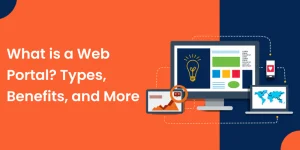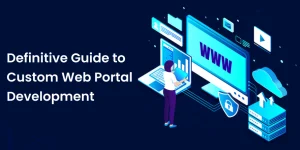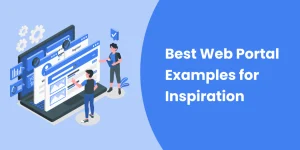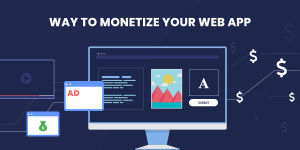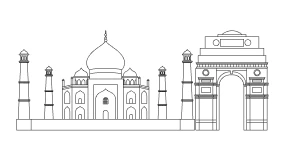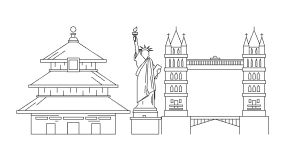Web Portal vs Website: What’s the Difference?

We are in the time of website and web portal, but they are not the same. Understanding the difference between portal and website is important because they have different objectives and functionalities. Whether you are a business, an organization, or an individual, creating an online presence is very important in this digital age. When it is about creating that presence, the choice between website and web portal can be intimidating.
Both are critical digital tools, but they have different features and serve different purposes. So how do you know which one will be best for your goals? In this blog, we will go over the differences, an explanation of what it means, and when to use which, to help you choose the right solution for yourself.
What is a Web Portal?
A web portal is a customized online platform that allows users to access resources, tools, and services from a single, centralized interface. In simple terms, a web portal acts as a digital gateway where users can log in to view personalized content, data, and applications based on their role or preferences.
Unlike a standard website that mainly provides general information, a web portal is interactive and designed to deliver a more tailored experience through secure user authentication and role-based access.
Use Cases of Web Portal
- Corporate Portals – Employees use employee portals with internal resources and documents, schedules, and company-specific tools – companies like Microsoft.
- Customer Portals – Banking sites (like Chase or PayPal) enable customers to sign into secure accounts to view and manage transactions and access financial tools.
- Education Portals — Applications such as Moodle or Blackboard provide students and faculty access to courses, grades, assignments, and other academic resources.
- Healthcare Portals –MyChart: Patients can view medical records, schedule appointments, and communicate with providers securely via this site.
- Government Portals – e.g. USA. gov for citizens for access to public services, tax information, and government forms.
Web portals focus on delivering relevant, personalized content to users, making them perfect for organizations that need a secure, interactive platform for managing specific services.
Are You Planning to Develop a Website or Web Portal?
Reach out to us at Guru TechnoLabs, and let our experts guide you in
developing the perfect digital solution for your business!
What is a Website?
A website is a set of related web pages that are distributed on at least one web server on the Internet. Web pages are relatively permanent pages that include various types of content like text, images, videos, and other interactive elements.
Websites are digital platforms where individuals, businesses, and organizations share information, promote services, or sell products. While web portals always require registration, websites are usually open to all users and require no personalization.
Use Cases of Website
- eCommerce Sites: eCommerce sites such as Amazon and Etsy allow users to search for products, shop and purchase, and interact with brands.
- Personal Blogs: These are blogs about very personal stories of people, like Humans of New York, where people share stories/experiences related to a particular niche.
- Business Websites: Nike or Apple are good examples of business websites that have information about products, company overview, and other services.
- News Websites: Websites like the BBC or CNN provide current news, articles, and multimedia content to a wide audience.
- Portfolio Sites: Creatives such as photographers, designers or artists create websites to showcase their art and attract clients.
Websites are great for anyone that wants to share content, promote a product, or just wants to maintain an online presence.
Key Differences Between Website and Web Portal
Although websites and web portals nowadays are both used as digital platforms, they vary significantly in terms of purpose, functionality, and the user experience. A website is a broad-based general-purpose platform that can be used to inform the masses like product information, news, or entertainment. It usually requires no login or personalization: its content is identical for all users.
On the other hand, a web portal is designed to be more interactive, secure, and personalized. It is accessible for authenticated users and gives access to certain resources or services adapted to the needs of each.
Knowing the differences can aid your decision on what platform is best for your goals — sharing information broadly to the public versus more personalized, user-driven information.
Here’s a simple table showing the difference between portal and website across key factors.
| Aspect | Website | Web Portal |
|---|---|---|
| Purpose | To provide general information or content. | To offer personalized services, resources, and tools. |
| Target Audience | Broad public audience. | Specific users (employees, customers, students, etc.). |
| User Access | No login required; accessible to anyone. | Requires user login and access control. |
| Content Type | Mostly static content like blogs, articles, or product listings. | Dynamic and personalized content based on user profile or preferences. |
| Interactivity | Limited interactivity (e.g., contact forms, comments). | High interactivity with tools, services, or applications. |
| Customization | Content is the same for all visitors. | Content, layout, and services are tailored to the user’s needs. |
| Examples | eCommerce sites (Amazon), personal blogs (WordPress), news sites (CNN). | Employee portals (Microsoft), customer portals (Banking websites), education portals (Moodle). |
| Navigation | Simple, easy to browse. | Complex, often with a dashboard and specific sections based on user roles. |
| Security | Minimal security; mostly public information. | High security often involves sensitive information like personal accounts, data, etc. |
| User Engagement | Focuses on passive engagement (reading, browsing). | Active engagement with user-specific tools (accessing resources, managing accounts). |
This table breaks down the primary differences between websites and web portals, helping you understand their unique functionalities and decide which one best suits your needs.
Explore our latest blogs to learn about the different types of web portals and how they can benefit your business
Let Guru TechnoLabs Choose the Right Solution for Your Business
Yes, websites and web portals are different, and knowing the difference between website and web portal can help you decide which solution is right for your business. And if you’re still confused about which one you should go for, then Guru TechnoLabs is here to help you out.
Get in touch with us for a free consultation session, and our expert team will study your business needs and provide customized advice. After helping you weigh the pros and cons, we’ll find the right solution to suit your goals.



